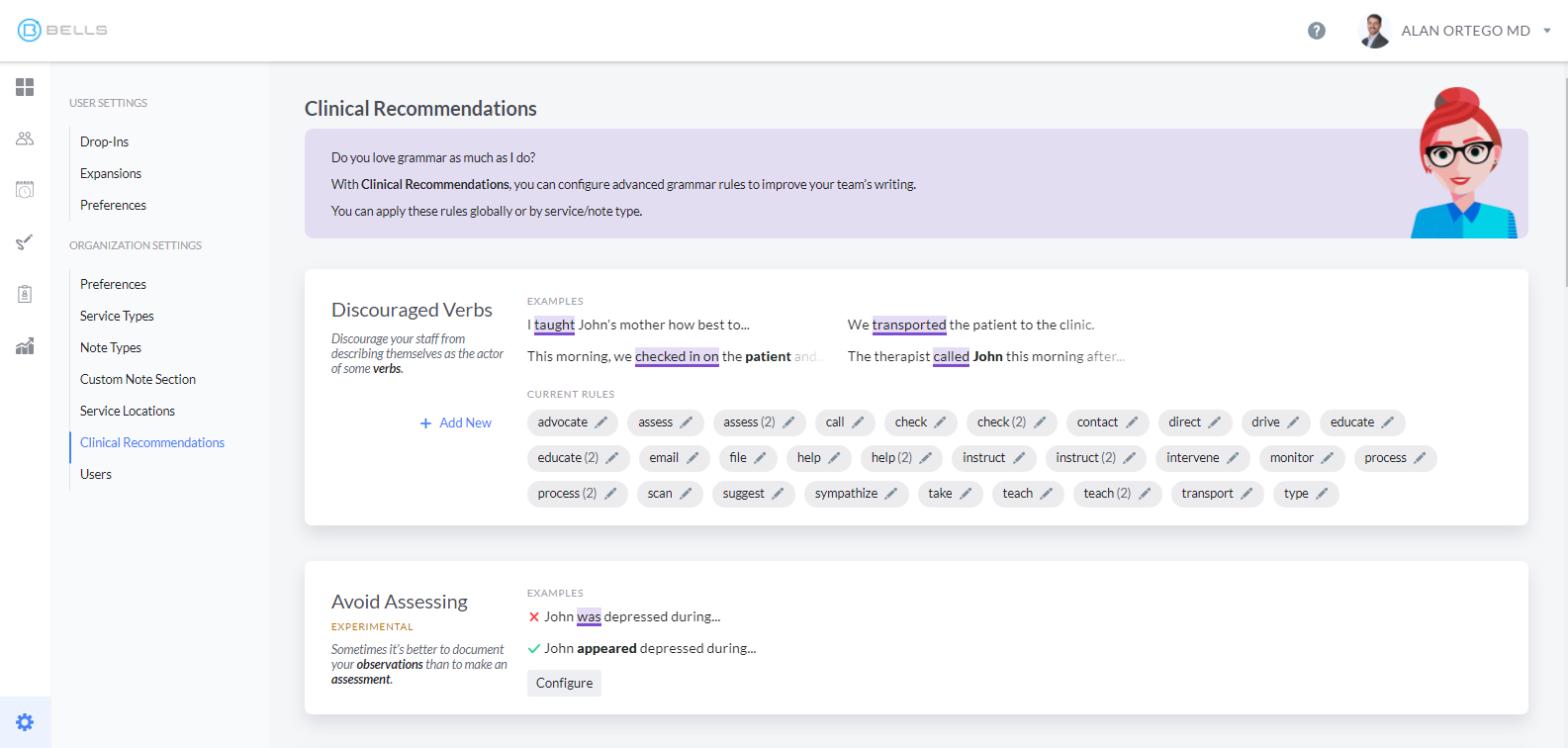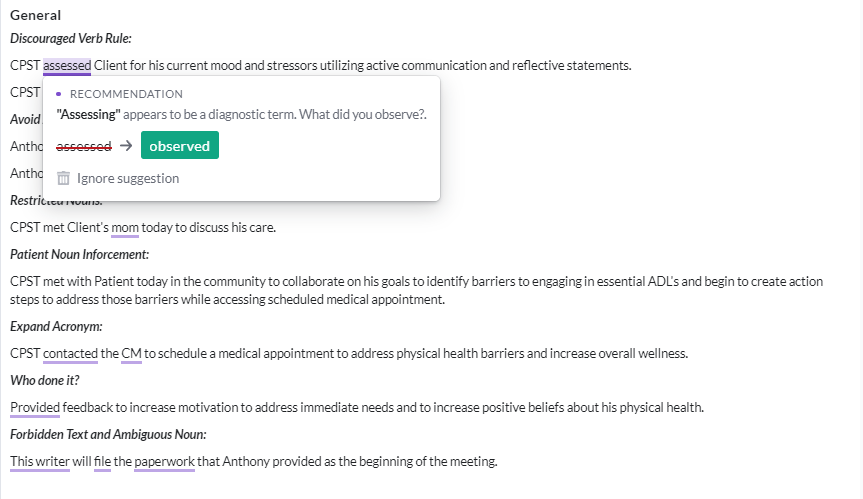Clinical Recommendations Capabilities

Note: If you're not seeing the Clinical Recommendations as part of your Bells application, please coordinate with your Remarkable Health representative to get set-up and training scheduled.
Recommendation Categories
Discouraged Verbs
Discourages staff from using particular verbs that might not meet their credentials.

Discouraged Verb example:
Entered: CPST assessed the Patient for his current mood and stressors utilizing active communication and reflective statements.
Recommended: CPST noted the Patient for his current mood and stressors utilizing active communication and reflective statements.
Avoid Assessing
Ensures only properly credentialed staff can make assessments in their notes.

Avoid Assessing example:
Entered: "Anthony was anxious today and was constantly fidgeting and needing to pace."
Recommended: "Anthony appeared anxious today and was constantly fidgeting and needing to pace."
Restricted Nouns
Prevents staff from using specific nouns as part of the progress note.

Restricted Nouns example:
Entered: CPST met the Patient's mom today to discuss his care.
Recommended: CPST met the Patient's mother today to discuss his care.
Ambiguous Nouns
Reduces the ambiguity of nouns by requiring adjectival or adverbial modifiers.

Ambiguous Nouns example:
Entered: This writer will file the paperwork that Anthony provided at the beginning of the meeting.
Recommended: This writer will file the intake paperwork that Anthony provided at the beginning of the meeting.
Forbidden Text
Restricts words or phrases from being used in progress notes. These should simply never be written in notes.

Forbidden Text example:
Entered: This writer will file the paperwork that Anthony provided at the beginning of the meeting.
Recommended: I will file the paperwork that Anthony provided at the beginning of the meeting.
Patient Labels
Enforces your organization's preferred label for the people they serve.

Patient Noun enforcement example:
Agency is configured to use "Client"
Entered: CPST met with the Patient today in the community to collaborate on his goals to identify barriers to engaging in essential ADL's and begin to create action steps to address those barriers while accessing scheduled medical appointments.
Recommended: CPST met with the Client today in the community to collaborate on his goals to identify barriers to engaging in essential ADL's and begin to create action steps to address those barriers while accessing scheduled medical appointments.
Expand Acronyms
Encourages staff to write out the full form of an acronym. This is similar to the Expansions feature but is at the organization level instead of the individual user level. Like expansions, the acronyms can be configured to expand each time or only once in the note.

Expand Acronym example:
Entered: CPST contacted the CM to schedule a medical appointment to address physical health barriers and increase overall wellness.
Recommended: CPST contacted the case manager to schedule a medical appointment to address physical health barriers and increase overall wellness.
Third-Person Only
Eliminates first and second-person narratives and enforce the third person.

Third-Person Only example:
Entered: It was mentioned to me that the patient was scheduling a follow-up medical appointment.
Recommended: It was mentioned to the case manager that the patient was scheduling a follow-up medical appointment.
Who done it?
Avoids staff from starting sentences with a verb.

Who done it? example:
Entered: Provided feedback to increase motivation to address immediate needs and to increase positive beliefs about his physical health.
Recommended: I provided feedback to increase motivation to address immediate needs and to increase positive beliefs about his physical health.
The alternatives of "I" and "We" are included by default when configuring this rule.
Redundant Much?
Discourages staff from using redundant intervention verbs more than 3 times in the note.

Redundant Much? example:
Entered: Addressed the patient's immediate needs. Addressed the request for more resources. The patient addressed the previous sessions mention of additional treatment.
Recommended: (after 3 uses of addressed) Handled the patient's immediate needs. Managed the request for more resources. The patient attended to the previous sessions mention of additional treatment.
The Redundant Much recommendation has some special behavior. This recommendation automatically creates the alternatives added to the rule as additional rules with the same configuration. For example, if I set up a Redundant Much rule for Observe with the alternatives of Watch, See and Witness, when I save, three additional rules for Watch, See and Witness will also be created with the same rules and alternatives.
Example of Clinical Recommendations in use:
